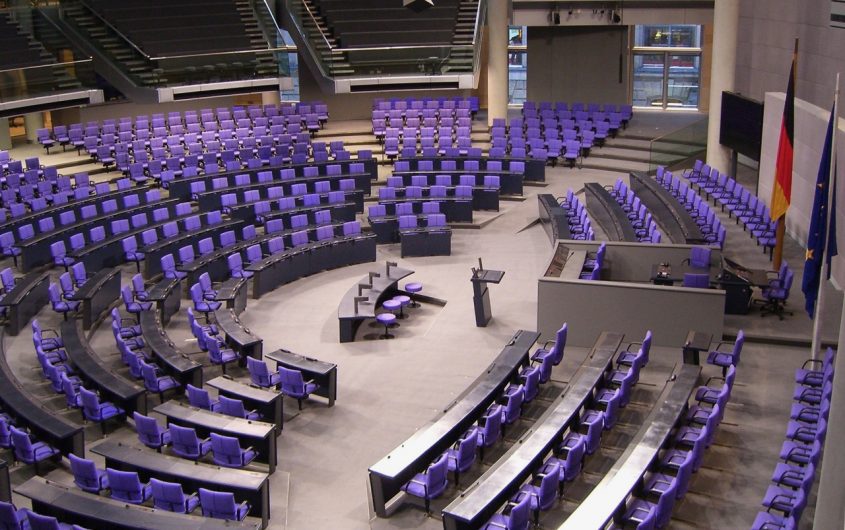
Is Berlin Becoming Weimar?

Stephen F. Szabo
Senior Fellow
Dr. Stephen F. Szabo is a Senior Fellow at AICGS, where he focuses on German foreign and security policies and the new German role in Europe and beyond. Until 2017, he was the Executive Director of the Transatlantic Academy, a Washington, DC, based forum for research and dialogue between scholars, policy experts, and authors from both sides of the Atlantic. Prior to joining the German Marshall Fund in 2007, Dr. Szabo was Interim Dean and Associate Dean for Academic Affairs and taught European Studies at The Paul H. Nitze School of Advanced International Studies, Johns Hopkins University. He served as Professor of National Security Affairs at the National War College, National Defense University (1982-1990). He received his PhD in Political Science from Georgetown University and has been a fellow with the Alexander von Humboldt Stiftung, the Woodrow Wilson International Center for Scholars, and the American Academy in Berlin, as well as serving as Research Director at AICGS. In addition to SAIS, he has taught at the Hertie School of Governance, Georgetown University, George Washington University, and the University of Virginia. He has published widely on European and German politics and foreign policies, including. The Successor Generation: International Perspectives of Postwar Europeans, The Diplomacy of German Unification, Parting Ways: The Crisis in the German-American Relationship, and Germany, Russia and the Rise of Geo-Economics.
The collapse of the talks to form a new German government following the election of seven parties (counting the Bavarian CSU as a party separate from the CDU) to the Bundestag opens up the prospect of Germany returning to the conditions which led to the collapse of the Weimar Republic in 1933. Like Weimar, the Federal Republic is now a multiparty system in which extreme parties have begun to paralyze the working of the parliamentary democracy. The rise of the Alternative for Germany (AfD) has resulted in a fracturing of the right which follows the fragmentation of the left. The former Communist Linke Party and the not-so-new-right AfD polled approximately one quarter of the votes in the September federal election, while the two mainstream Volksparteien, the Christian Democrats and the Social Democrats, barely managed to get a majority between the two of them. The result is a multiparty system which is incapable of producing stable governments. This is a messy un-German result, but is democracy in danger?
Comparisons with Weimar, while tempting, are misleading but not entirely wrong. In Weimar democracy became associated with disorder, economic collapse, and national humiliation. The multiparty system produced extremist parties on both the right and the left and made governing from the center impossible. It was a democracy without democrats as the elites were authoritarian and the old Prussian class system survived. Today Germans are thoroughly democratic and the elites are committed to democracy and to avoiding any fall back to the old patterns of politics that produced disaster. The economy is doing well and the public associates democracy with economic prosperity and order—in stark contrast to Weimar. This Germany is a winner and its people see its power and influence as increasing in a Europe where it is the most important and admired country.
Yet, as in Austria, there is a cultural pessimism and concern about identity that was present in Weimar. We are witnessing a return of the repressed and of a resentment about the right to national identity and pride which has been suppressed for over seven decades. Added to this is the return of 18 million eastern Germans who were socialized in totalitarian societies and have had only had 27 years of experience with democracy, an experience in which democracy was associated with economic and social insecurity and a feeling of being occupied not by foreigners but by western Germans. It is in eastern Germany where both Die Linke and AfD have prospered and it is eastern Germany which is creating a stalemated Republic. The generous open-door policy of Angela Merkel to largely Muslim refugees in 2015 combined the desire of many western Germans to be moral and open with the feelings of helplessness and cultural pessimism found especially in the east and in Bavaria. The often crude and angry receptions the chancellor received in the east during the election campaign was similar to the anger and emotion evoked by Trump supporters against his opponents.
In short, Weimar now can be found in many places in eastern Germany and its impact is creating Weimar conditions for all of Germany. Added to this is the rise of similar sorts of right nationalism in the UK, the United States, and large parts of Europe. Germany has never been an island and has always been subject to the cross currents of developments in Europe and the United States. The hopes of many that it could provide the core of a resurgent western liberal order are now in great doubt. Unlike countries like Belgium, the Netherlands, and Italy, Germany has a low tolerance for instability and disorder. The danger is that even with a strong economy and widespread admiration for the German model outside of the country, the vulnerability to instability may endanger a model which has worked so well for longer than any other in German history.
Dr. Stephen F. Szabo is a Senior Fellow at AGI.








